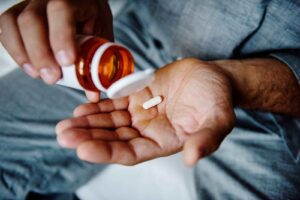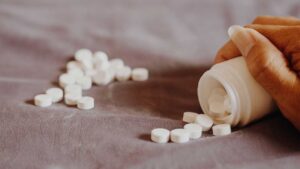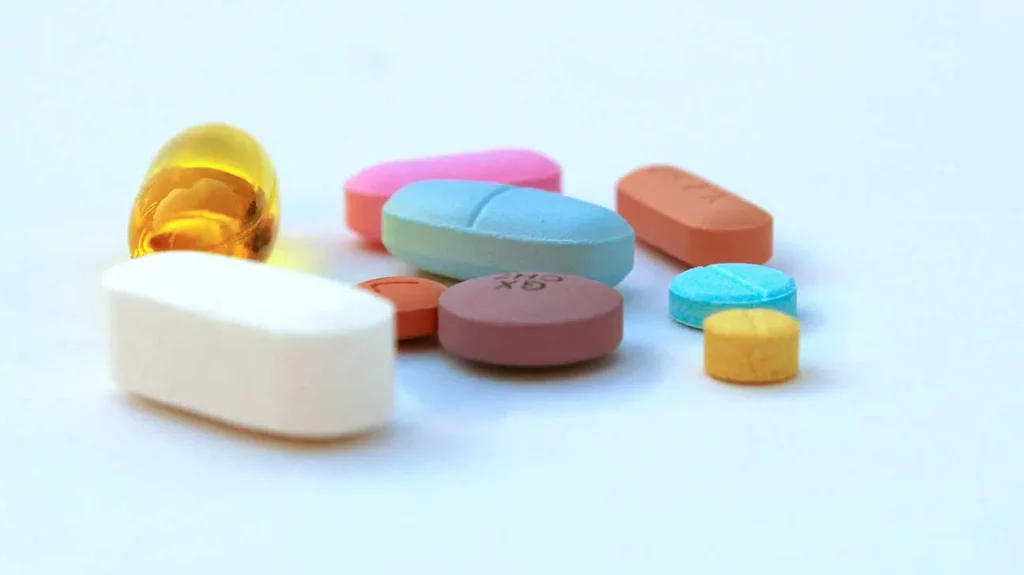Quetiapine, commonly known by its brand name Seroquel, is an atypical antipsychotic medication widely prescribed for the treatment of mental health conditions. While quetiapine can be highly effective in managing these conditions, it has also become a substance of misuse for some individuals. This blog explores the complexities of quetiapine addiction, including its withdrawal symptoms, effects, and the available paths to recovery.
Contents
What is Quetiapine?
 Quetiapine is an atypical antipsychotic medication primarily used to treat mental health conditions such as schizophrenia, bipolar disorder, and major depressive disorder. It works by altering the actions of certain chemicals in the brain, particularly serotonin and dopamine. This helps stabilize mood, reduce psychotic symptoms, and improve cognitive function.
Quetiapine is an atypical antipsychotic medication primarily used to treat mental health conditions such as schizophrenia, bipolar disorder, and major depressive disorder. It works by altering the actions of certain chemicals in the brain, particularly serotonin and dopamine. This helps stabilize mood, reduce psychotic symptoms, and improve cognitive function.
Quetiapine is available in immediate-release and extended-release formulations, allowing for flexible dosing to suit individual patient needs. Despite its effectiveness in managing severe mental health conditions, it is sometimes misused due to its sedative properties. When taken in higher doses than prescribed or used without a prescription, it can create a calming or euphoric effect. This can lead to physical dependence and addiction.
Is Quetiapine For Sleep Addictive?
Quetiapine is sometimes prescribed off-label to help with sleep issues due to its sedative effects, particularly at lower doses. While it can be effective in promoting sleep, the use of quetiapine for this purpose is controversial. One of the primary concerns is the potential for developing a dependency on the medication. When used regularly to aid sleep, individuals may begin to rely on quetiapine to fall asleep, leading to psychological dependence.
Over time, the body may also develop a tolerance, requiring higher doses to achieve the same sedative effect. This can further increase the risk of addiction. Moreover, quetiapine’s use for sleep can carry significant risks, especially when taken without medical supervision or beyond the prescribed amount. Therefore, while this medication can be beneficial, it should be used with caution and under strict medical guidance.
What Are The Withdrawal Symptoms Of Quetiapine?
 Withdrawal from quetiapine can lead to a range of symptoms as the body adjusts to the absence of the medication. These symptoms can vary in intensity depending on the dosage and duration of use. Common withdrawal symptoms include:
Withdrawal from quetiapine can lead to a range of symptoms as the body adjusts to the absence of the medication. These symptoms can vary in intensity depending on the dosage and duration of use. Common withdrawal symptoms include:
- Insomnia and Sleep Disturbances: Difficulty falling asleep or staying asleep is a frequent withdrawal symptom, often causing significant discomfort and fatigue.
- Nausea and Vomiting: Gastrointestinal issues such as nausea, vomiting, and stomach cramps are common during quetiapine withdrawal.
- Headaches: Persistent headaches can occur as the body readjusts to the absence of quetiapine.
- Anxiety and Agitation: Increased anxiety, restlessness, and irritability are typical psychological withdrawal symptoms.
- Depression: A resurgence or worsening of depressive symptoms may occur, particularly if quetiapine was used to manage a mood disorder.
- Dizziness and Lightheadedness: Dizziness and a feeling of lightheadedness are often reported during the withdrawal phase.
- Sweating and Night Sweats: Excessive sweating, including night sweats, can be a physical symptom of withdrawal.
- Flu-like Symptoms: Some individuals experience symptoms similar to the flu, including muscle aches, chills, and fatigue.
- Rebound Psychosis or Mania: In cases where quetiapine was used to treat schizophrenia or bipolar disorder, there is a risk of rebound psychosis or mania. This means symptoms of the underlying condition may return or worsen.
It is crucial to taper off quetiapine under medical supervision to minimize these withdrawal symptoms. Ultimately, ensure a safe and effective discontinuation process.
What Are The Effects of Quetiapine Addiction?
Quetiapine addiction can have a wide range of detrimental effects on both physical and mental health, as well as on various aspects of an individual’s life. Understanding these effects is crucial for recognizing the severity of quetiapine misuse and the importance of seeking appropriate help.
Physical Effects
One of the primary physical effects of quetiapine addiction is the development of tolerance, where increasingly higher doses are needed to achieve the desired sedative or calming effects. This can lead to severe health issues, including cardiovascular problems such as tachycardia (rapid heart rate) and hypotension (low blood pressure). Additionally, prolonged misuse can result in significant weight gain, diabetes, and other metabolic issues due to quetiapine’s impact on glucose regulation and appetite.
Psychological and Behavioral Effects
Psychologically, quetiapine addiction can exacerbate mental health conditions, leading to increased symptoms of anxiety, depression, and paranoia. The dependency on drugs for emotional regulation can make it difficult to cope with stress and other life challenges. Behaviorally, individuals might engage in drug-seeking behaviors, such as doctor shopping or acquiring the drug through illegal means. This leads to legal and social consequences.
Impact on Daily Life
The overall quality of life for someone addicted to quetiapine can significantly decline. The cognitive impairments caused by the drug can affect job performance and academic achievements, leading to potential job loss or academic failure. Financial problems may arise due to the cost of acquiring the drug illegally or through multiple prescriptions. Furthermore, the cycle of addiction often leaves individuals unable to fulfill personal responsibilities. And, causing further deterioration in their personal and professional lives.
Addressing quetiapine addiction requires comprehensive treatment. Also, support from mental health professionals to manage both the addiction and any underlying mental health conditions.
How To Recover From Quetiapine Addiction?
 Recovering from quetiapine addiction involves a comprehensive approach that addresses both the physical and psychological aspects of dependency.
Recovering from quetiapine addiction involves a comprehensive approach that addresses both the physical and psychological aspects of dependency.
Medical tips
Here are the key steps in the recovery process:
Medical Detoxification
The first step in recovering from quetiapine addiction is to undergo medical detoxification. This process involves gradually tapering off the medication under the supervision of healthcare professionals to minimize withdrawal symptoms. In a controlled environment, medical staff can manage and alleviate withdrawal symptoms such as insomnia, nausea, anxiety, and dizziness, ensuring a safer and more comfortable detox experience.
Behavioral Therapy
Behavioral therapy is crucial for addressing the psychological aspects of addiction. Cognitive Behavioral Therapy (CBT) is commonly used to help individuals understand and change the thought patterns and behaviors that contribute to their addiction. Other therapeutic approaches, such as Dialectical Behavior Therapy (DBT) or Motivational Interviewing (MI), may also be effective.
Support Groups
Participating in support groups can provide valuable peer support and encouragement throughout the recovery journey. Groups like Narcotics Anonymous (NA) or specialized support groups for prescription drug addiction offer a sense of community and shared experiences. These groups often follow a 12-step program that guides individuals through the process of recovery and helps them build a network of sober peers.
Medication-Assisted Treatment
In some cases, medication-assisted treatment (MAT) may be used to help manage withdrawal symptoms and reduce cravings. This approach combines the use of medications with counseling and behavioral therapies. Medications used in MAT for quetiapine addiction will be tailored to the individual’s needs and supervised by a healthcare professional.
Holistic Approaches
Incorporating holistic approaches can support overall well-being and recovery. Practices such as yoga, meditation, mindfulness, and exercise can help reduce stress, improve mental health, and enhance physical health. Nutritional counseling and a balanced diet also play a significant role in restoring physical health and energy levels.
Aftercare and Relapse Prevention
Recovery from quetiapine addiction is an ongoing process that requires continued support and aftercare. Developing a relapse prevention plan with the help of a therapist or counselor is essential. This plan may include regular therapy sessions, participation in support groups, and strategies for managing triggers and high-risk situations. Building a strong support system of family and friends who understand the recovery process is also crucial for long-term success.
Professional Help
Seeking help from addiction specialists, psychiatrists, and counselors with experience in substance use disorders is vital. These professionals can provide personalized treatment plans, ongoing support, and adjustments to the recovery strategy as needed.
Recovering from quetiapine addiction is a challenging but achievable goal. With the right combination of medical care, therapy, support, and lifestyle changes, individuals can overcome addiction and work towards a healthier, more fulfilling life.
Is 25mg of Quetiapine A Lot?
A dose of 25 mg of quetiapine is generally considered a low dose. It is often used for purposes such as managing insomnia, and anxiety, or initial dosing for individuals who are sensitive to medications. In clinical practice, 25 mg is frequently prescribed off-label for sleep disturbances due to its sedative effects. And, providing a safer option for short-term use in promoting sleep without the need for higher doses.
For the treatment of conditions like schizophrenia, bipolar disorder, or major depressive disorder, the therapeutic dose of quetiapine typically ranges from 150 mg to 800 mg per day. And, depending on the specific condition and patient response. Therefore, in comparison, 25 mg is a relatively small amount. However, even at this lower dose, quetiapine can cause side effects and potential dependency issues if used improperly or without medical supervision.
Conclusion
Quetiapine, while effective for treating various mental health conditions, carries risks of addiction and serious side effects, especially when misused. Understanding its potential for dependency, recognizing withdrawal symptoms, and knowing the comprehensive steps for recovery are crucial.
If you or someone you know is struggling with quetiapine addiction, it’s important to seek professional help. With medical support, therapy, and a strong support system, overcoming quetiapine addiction is possible, leading to a healthier and more fulfilling life.
